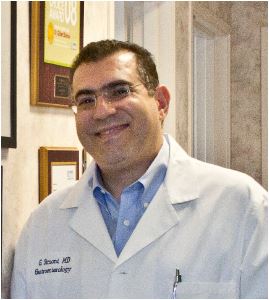Thousand Oaks Physician Sheds Light on Cancer Risk to Acid Reflux Sufferers
Many of the estimated 25 million Americans who suffer from daily symptoms of acid reflux, also referred to as heartburn or GERD (gastroesophageal reflux disease) find taking medications provide much needed relief. However, the use of medications for acid reflux does not eliminate the most significant risk affiliated with GERD: the potential for esophageal cancer – the fastest growing cancer in the United States.
Last year, 14,500 deaths were attributed to esophageal cancer in the United States alone. The incidence rate of esophageal cancer has increased 400% in the past 20 years.
The connection between acid reflux and esophageal cancer

Perhaps you are wondering, as I was, how can esophageal cancer develop from acid reflux? I asked board-certified gastroenterologist, Gilbert Simoni, MD – founder of Advanced GI, Inc. in Thousand Oaks and he explained, “Over time the acid splashing up from the stomach into the esophagus can cause normal skin-like cells to change into tougher, more acid-resistant cells, a condition called Barrett’s esophagus. Barrett’s esophagus increases your risk of developing esophageal cancer by a minimum of 30 fold.”
ECAN (Esophageal Cancer Action Network), a non-profit aimed at awareness and prevention, is getting the word out about the connection between acid reflux and esophageal cancer. According to the ECAN website, study findings show that 40% of those who presented with Barrett’s had no prior symptoms of reflux – screening only those with reflux will not capture all cases. The site recommends that those with persistent heartburn seek screening for Barrett’s esophagus. Even if your acid reflux symptoms are controlled, you still could be at risk. Patients with unexplained sleep disorders, chronic cough, hoarseness, post-nasal drip or chest pain, may not realize these symptoms can be caused by acid reflux, even without the classic heartburn symptoms. The only way to diagnose Barrett’s is with an endoscopy, which should be performed by a gastroenterologist.
Getting off meds, feeling better and reducing risk
In 2008 the FDA approved a procedure called trans oral fundoplication, or TIF. During a TIF procedure, the defective valve of a GERD patient is reshaped and strengthened, providing an anatomical correction and solution to reflux. The procedure is done trans-orally, or through the mouth so there are no incisions. The non-invasive nature of the TIF procedure reduces risk and speeds recovery time – but the best part is that it helps get patients off meds - who’s long term side effects include possible bone loss - and out of the risk zone for GERD-related esophageal cancer.
Thousand Oaks doctor first to bring procedure to Ventura County
Gilbert Simoni, MD, a pioneer of TIF in Ventura County, performed the county’s first TIF in 2009. An advocate for prevention, he is pleased to see the results his patients achieve, knowing they have improved their quality of life. “Besides improving the quality of life for patients and reducing cancer risk, I embrace this new technology because of its success rate. Studies show that two years after TIF, 93% of patients reported cessation of heartburn and 79% reported a complete cure or remission of their GERD”, said Dr. Simoni.
Dr. Simoni was the first gastroenterologist in Ventura County to obtain the special skills and training required to perform TIF. He partnered with Los Robles Hospital to bring this non-invasive procedure for GERD to the local medical community over two years ago. When asked what factors encouraged him to seek the special training required to perform TIF he presented these compelling facts:
The non-invasive nature of TIF provides a quicker recovery than procedures done in the past and it offers a long-term solution for chronic GERD – pills don’t.
10,500 TIF procedures have been performed in the U.S. since 2008
In 2010 the FDA published a warning letter suggesting a correlation between the medications used to treat acid reflux and bone loss
A patient shares his experience
Newbury Park resident Kevin Weber underwent the TIF procedure just six weeks ago, after suffering 11 years with acid reflux. When asked about his first Thanksgiving dinner after the procedure, Kevin answered, “It went great - no reflux, and finally no more pills”. Kevin wants to help get the word out about the risks of on-going acid reflux and the success he’s experienced with this procedure “ I wish I had this procedure sooner” he said, “Holiday eating will bring pleasure instead of discomfort this year, thanks to Dr. Simoni.”
If you have - or suspect you have - acid reflux, seek the help of your primary care physician, an ENT (Ear, nose and throat specialist) or go directly to a gastroenterologist. Ignoring symptoms or neglecting to get screening can be a serious threat to your future health.
--------------------------------------------------------------------------------------------------------------------
For more information:
Call out:
Last year, 14,500 deaths were attributed to esophageal cancer in the United States alone. The incidence rate of esophageal cancer has increased 400% in the past 20 years.

